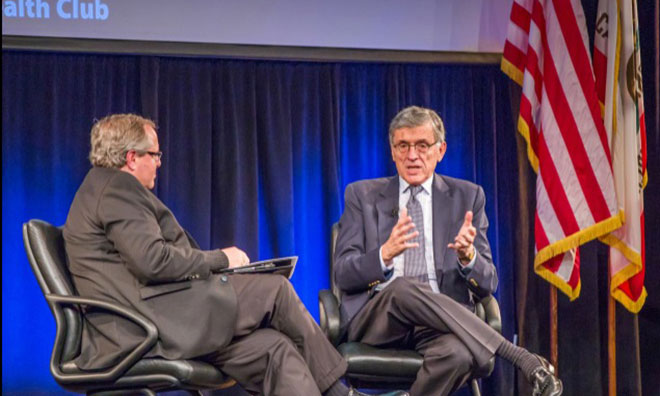
FCC’s Wheeler Tries to Clarify Net Neutrality Stance, Again
Less than a week after facing a public backlash on proposed open-internet rules that would allow for a so-called "fast lane" of access, Federal Communications Commission Chairman Tom Wheeler offered another take on the plan, saying safeguards would be in place to prevent perceived worst-case scenarios.
Less than a week after facing a public backlash on proposed open-internet rules that would allow for a so-called fast lane of access, Federal Communications Commission Chairman Tom Wheeler offered another take on the plan, saying safeguards would be in place to prevent perceived worst-case scenarios.
Maybe the second try will make it an easier sell.
Last week, Federal Communications Commission Chairman Tom Wheeler found himself at the center of controversy after news reports revealed the FCC was considering open-internet rules that would allow for a so-called fast lane for internet traffic, which would let service providers charge content providers for faster access.
Wheeler responded with a blog post last week to clarify the FCC’s position, and on Tuesday he offered up another take, attempting to clear up the “misinformed interpretation” of the commission’s Open Internet Notice of Proposed Rulemaking (NPRM). In his post, he broke down in detail the government’s commitment to keeping the web open.
“At the heart of the proposed NPRM is the assurance that it won’t be possible for an internet provider to degrade the service available to all,” he wrote. “Let me re-emphasize that: the internet will remain like it is today, an open pathway. If a broadband provider (ISP) acts in a manner that keeps users from effectively taking advantage of that pathway then it should be a violation of the open-internet rules.”
Arguments that a “fast lane” would allow companies to degrade performance for companies who didn’t pay extra “misses the point,” Wheeler wrote, adding that companies would be blocked from taking such actions. Ultimately, he argued that by moving forward now, the FCC could solidify standards for the future.
“The recommendation on which we seek comment would result in timely and meaningful open-internet rules,” he wrote. “This NPRM means that consumers, startup innovators, venture capitalists, and others who have been waiting…and waiting…and waiting for the certainty of rules would finally have something on which they can rely. We have been talking about net neutrality for a decade; it is time to put something in place—and to do it with dispatch.”
Tech Groups’ views
Also on Tuesday, National Cable & Telecommunications Association CEO Michael Powell—a former FCC chairman—said internet access shouldn’t be seen as a public utility, like electricity or water, and must have some space away from government oversight.
Powell made his comments, targeting critics who suggest that high-speed internet providers should be treated as “common carriers,” at the association’s Cable Show in Los Angeles.
“Because the internet is not regulated as a public utility, it grows and thrives, watered by private capital and a light regulatory touch,” Powell said, according to the New York Times. “It does not depend on the political process for its growth, or the extended droughts of public funding. This is why broadband is the fastest-deploying technology in world history, reaching nearly every citizen in our expansive country.” (Wheeler contradicted thatpoint in his blog post, arguing “there remains a shortfall in adequate broadband competition.”)
Meanwhile, the Consumer Electronics Association (CEA) offered a statement urging the FCC to ensure that competition in the internet space is maintained.
“As Chairman Wheeler said during our public conversation at the 2014 International CES, in a competitive environment the FCC doesn’t need to take much action related to an open internet, if any at all,” CEA President and CEO Gary Shapiro said in a statement. “We have long supported this view and publicly told the FCC it needs to ensure that competitive forces preserve the open internet. If the commission does act, then it must give effect to the limits on its authority and take a cautious and factual approach.”
The FCC's Tom Wheeler, shown speaking at the Computer History Museum in January. (photo via the FCC's Flickr page)






Comments